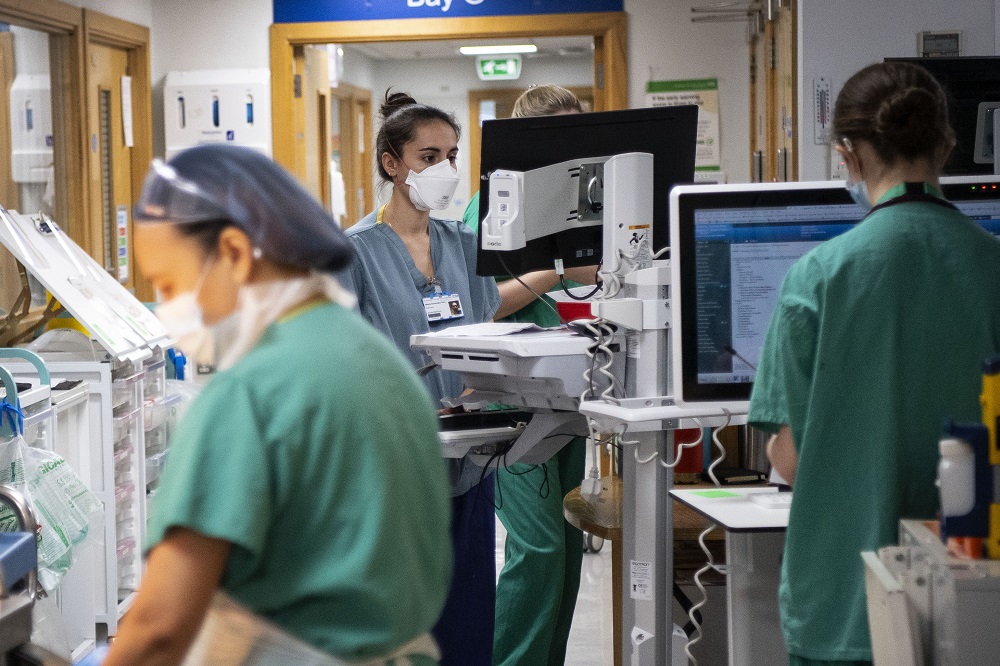Royal College of Nursing calls for ‘decent wage’ as it ballots on strike action

The only way to prevent nurses leaving the NHS and to fill thousands of vacancies is to pay them a “decent wage”, the head of the Royal College of Nursing (RCN) has said as the union ballots on strike action.
Nursing vacancies across the NHS in Wales are expected to have increased by almost 70% in the last year according to figures released last month by the Royal College of Nursing in Wales.
The RCN’s annual report on the workforce in Wales estimates there are currently 2,900 registered nurse vacancies in the NHS, a 69% increase on 2021.
The report also refers to the 3% pay increase been offered to nurses, which the union claims would leave some experienced nurses over £1,000 worse off.
Helen Whyley, RCN Wales director, said the data was “deeply troubling” and showed how “nurses are being pushed to the exit and are leaving the NHS”.
For the first time in its 106-year history, the RCN is asking all of its UK members if they are prepared to walk out over pay.
If its members support strike action, it will be the first ever strike by RCN members in England or Wales.
The college went on strike for the first time in its history in Northern Ireland in 2019.
Critical care
RCN General secretary Pat Cullen said nurses will still provide critical care if the strike goes ahead, as the RCN asks for a pay rise which exceeds inflation by 5%.
She told BBC Radio 4’s Today programme: “Nurses will do nothing to add to the risk that patients are facing every single day as a consequence of not having those nurses in the system to look after them.
“We continue to provide critical services throughout any strike.”
She said nurses are taking action to “save the health service”, adding they are currently “struggling to provide safe care for their patients” due to a lack of staff.
“Nurses have made every attempt to get Government to listen to the fact that there’s hundreds of thousands of nursing vacancies across this country and nurses are struggling to provide safe care for their patients,” she said.
“The only way that we’re going to address those vacancies and ensure that we recruit nurses into our health services and hold on to the brilliant services that we’ve got is if we pay them a decent wage.
“We’re very clear. Our position is that in order to address the crisis within the profession, it’s (pay of) 5% above the rate of inflation.
“If this Government does not address that, then our fear is that we’ll continue to lose the great nurses we’ve got.
“We’re losing thousands of nurses from our health service and that’s against a backdrop of thousands and thousands of vacancies.”
She added that the offer of a 3% wage rise “makes a difference to a nurse’s wage of 72p a week”.
She added: “I don’t think that’s the decent thing to do for nursing staff or the decent thing to do for patients.”
Nurses will start voting on Thursday on whether to strike over pay, with 300,000 members asked to take part in the ballot.
Formal dispute
The nurses’ trade union also lodged a formal dispute with the Welsh government over the increase, which was rejected by 94% of members.
Health minister Eluned Morgan announced the rise in July and said at the time it “recognises the dedication and commitment” of NHS staff.
Director Helen Whyley said: “Despite the First Minister announcing £991m of extra funding available for healthcare this year, none of it has been earmarked for nurses’ pay.
“Patients are waiting for treatment and care and nursing staff are needed to deliver that.
“For the past 18 months nursing staff have gone above and beyond in their response to the Covid-19 pandemic but now they feel undervalued, disenfranchised and angry.
“That’s why 94% voted that a 3% pay rise is totally unacceptable.”
The RCN said new analysis by London Economics to coincide with the ballot launch shows pay for nurses has declined at twice the rate of the private sector in the last decade.
Nurses’ real-terms earnings have fallen by 6% compared with 3.2% for private sector employees, it was found.
The ballot closes on 2 November.
Support our Nation today
For the price of a cup of coffee a month you can help us create an independent, not-for-profit, national news service for the people of Wales, by the people of Wales.





Odd innit that the Truss regime was happy to see seriously high earners trouser big bucks through cuts in tax yet can’t give a toss about the needs of key health service workers and front line service staff in other sectors. Truss would get my vote if she increased taxes by narrowing the 40% band to roughly 50-100k, 45% on 100-125 or 150k, and 50% on anything about that. And plug those loopholes for tax dodgers.